
一、背景
OpenHarmony系统移植最核心的步骤是内核的移植,内核的稳定是一切子系统稳定的基础,上一篇我们讲述了内核启动原理,以及vendor、board的开发配置,本文将介绍SoC层级的移植适配流程。
二、SoC适配
SoC配置芯片层级编译依赖库,包括CMSIS、HAL(硬件抽象层)等,这里包含操作总线、串口、时钟、寄存等库函数。
1、创建对应的文件目录结构
目录名称按照芯片厂家、芯片型号来创建,比如st公司下的stm32f4xx系列芯片。
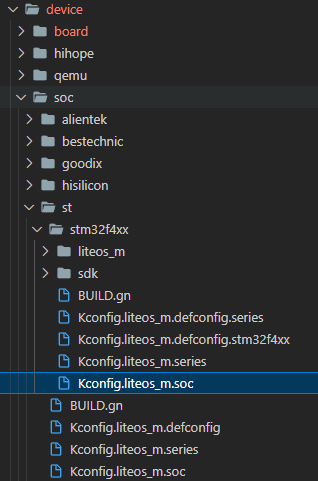
配置文件内容如下:
device/soc/st/stm32f4xx/Kconfig.liteos_m.defconfig.series
if SOC_SERIES_STM32F4xx
rsource "Kconfig.liteos_m.defconfig.stm32f4xx"
config SOC_SERIES
string
default "stm32f4xx"
endif
device/soc/st/stm32f4xx/Kconfig.liteos_m.defconfig.stm32f4xx
config SOC
string
default "stm32f4xx"
depends on SOC_STM32F4xx
device/soc/st/stm32f4xx/Kconfig.liteos_m.series
config SOC_SERIES_STM32F4xx
bool "STMicroelectronics STM32F4xx series"
select ARCH_ARM
select SOC_COMPANY_STMICROELECTRONICS
select CPU_CORTEX_M4
help
Enable support for STMicroelectronics STM32F4xx series
device/soc/st/stm32f4xx/Kconfig.liteos_m.soc
choice
prompt "STMicroelectronics STM32F4xx series SoC"
depends on SOC_SERIES_STM32F4xx
config SOC_STM32F407
bool "SoC STM32F407"
Endchoice
device/soc/st/Kconfig.liteos_m.defconfig
rsource "*/Kconfig.liteos_m.defconfig.series"
device/soc/st/Kconfig.liteos_m.defconfig
rsource "*/Kconfig.liteos_m.series"
device/soc/st/Kconfig.liteos_m.soc
config SOC_COMPANY_STMICROELECTRONICS
bool
if SOC_COMPANY_STMICROELECTRONICS
config SOC_COMPANY
default "st"
rsource "*/Kconfig.liteos_m.soc"
endif # SOC_COMPANY_STMICROELECTRONICS
device/soc/st/BUILD.gn
if (ohos_kernel_type == "liteos_m") {
import("//kernel/liteos_m/liteos.gni")
module_name = get_path_info(rebase_path("."), "name")
module_group(module_name) {
modules = [ "stm32f4xx" ]
}
}
device/soc/st/stm32f4xx/BUILD.gn
if (ohos_kernel_type == "liteos_m") {
import("//kernel/liteos_m/liteos.gni")
module_name = get_path_info(rebase_path("."), "name")
module_group(module_name) {
modules = [ "liteos_m", "sdk" ]
}
}2、移植HAL库函数等文件
对于STM32F407我们可以使用官方的STM32CubeMX生成对应的标准的hal库函数文件。
(1)选择ACCESS TO MCU SELECTOR。
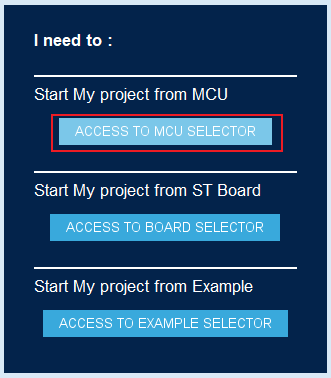
(2)勾选Arm Cortex-M4 --> STM32F4 --> STM32F407ZGTx。
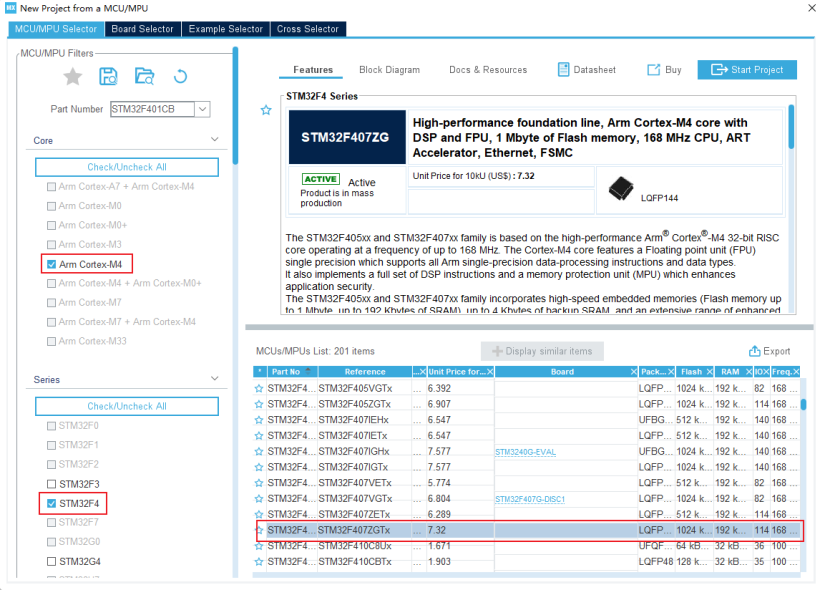
(3)填写工程名称,选择工程保存路径,选择Makefile作为编译工具,点击GENERATE CODE生成工程代码。
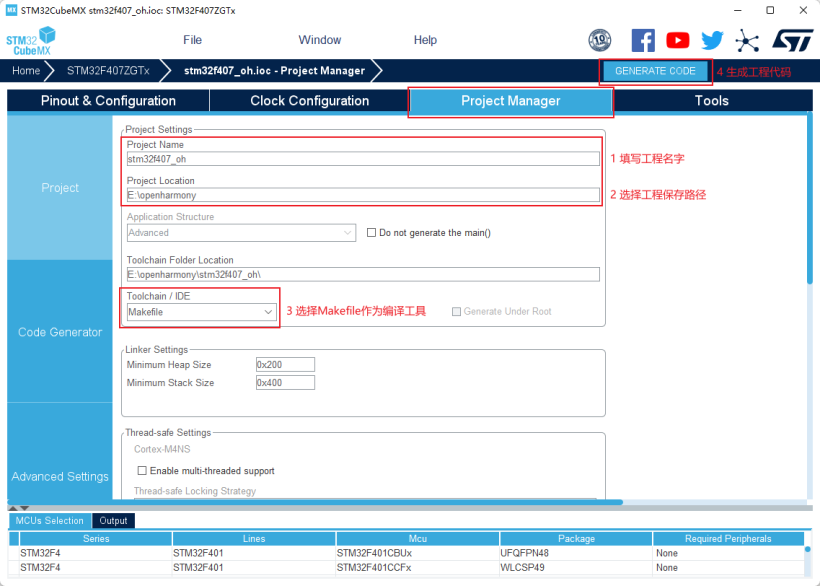
(4)使用vscode打开目录,我们得到如下工程。
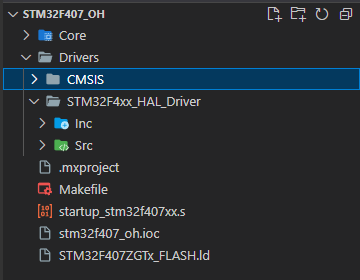
回顾一下之前讲过的系统启动的流程:
- HAL初始化
- 系统时钟初始化
- 系统初始化
- 系统启动
接下来我们将HAL库函数文件及芯片头文件迁移到OH代码中,文件路径如下:
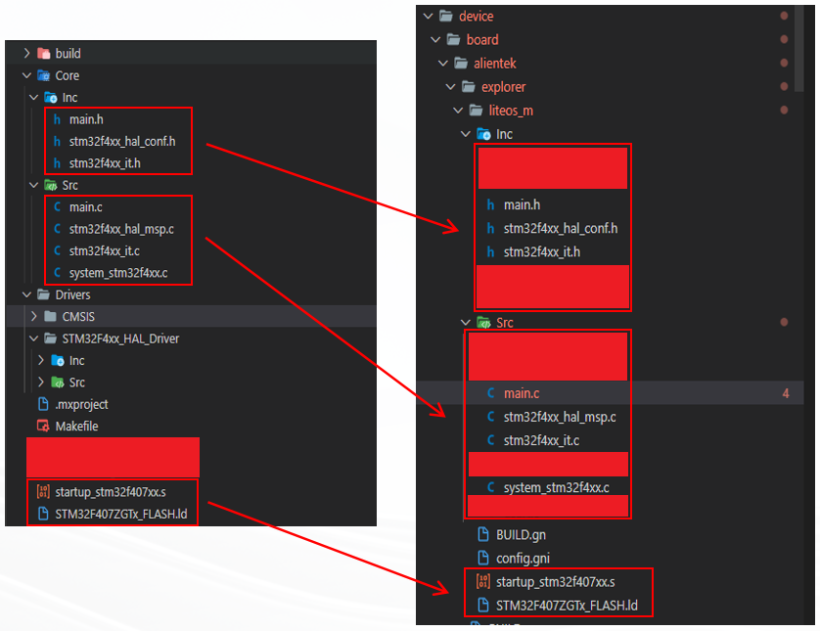
将Drivers中的CMSIS、STM32F4xx_HAL_Driver复制到/device/soc/st/stm32f4xx/sdk/Drivers中。
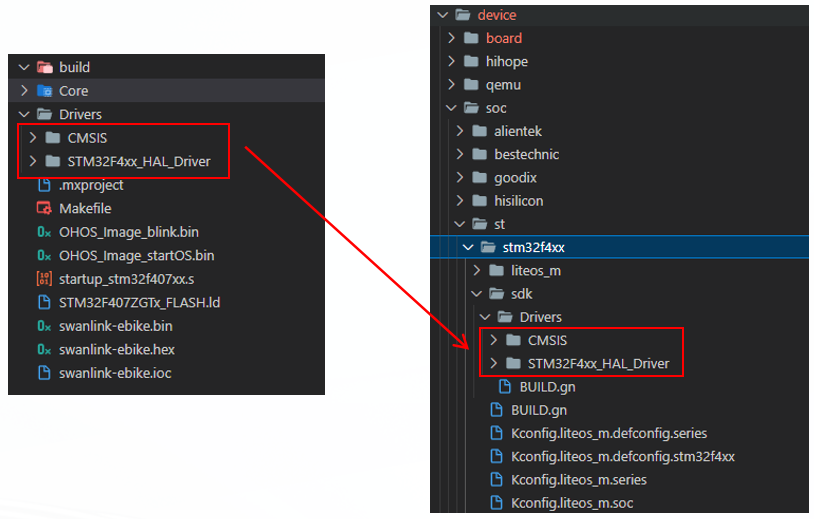
3、修改系统编译配置文件
使用OH的gn以及config文件配置系统编译流程以及包依赖关系,涉及到的配置文件如下:
device/board/alientek/explorer/liteos_m/config.gni# Kernel type, e.g. "linux", "liteos_a", "liteos_m".kernel_type = "liteos_m"# Kernel version.kernel_version = "3.0.0"# Board CPU type, e.g. "cortex-a7", "riscv32".board_cpu = "cortex-m4"# Board arch, e.g. "armv7-a", "rv32imac".board_arch = ""# Toolchain name used for system compiling.# E.g. gcc-arm-none-eabi, arm-linux-harmonyeabi-gcc, ohos-clang, riscv32-unknown-elf.# Note: The default toolchain is "ohos-clang". It's not mandatory if you use the default toolchain.board_toolchain = "arm-none-eabi-gcc"use_board_toolchain = true# The toolchain path installed, it's not mandatory if you have added toolchain path to your ~/.bashrc.board_toolchain_path = ""# Compiler prefix.board_toolchain_prefix = "arm-none-eabi-"# Compiler type, "gcc" or "clang".board_toolchain_type = "gcc"#Debug compiler optimization level optionsboard_opt_flags = ["-mcpu=cortex-m4","-mthumb","-mfpu=fpv4-sp-d16","-mfloat-abi=hard",]# Board related common compile flags.board_cflags = ["-Og","-Wall","-fdata-sections","-ffunction-sections","-DSTM32F407xx","-DHAL_UART_MODULE_ENABLED"]board_cflags += board_opt_flagsboard_asmflags = ["-Og","-Wall","-fdata-sections","-ffunction-sections",]board_asmflags += board_opt_flagsboard_cxx_flags = board_cflagsboard_ld_flags = ["-T${ohos_root_path}device/board/alientek/explorer/liteos_m/STM32F407ZGTx_FLASH.ld"]board_ld_flags += board_opt_flags# Board related headfiles search path.board_include_dirs = [ "//utils/native/lite/include" ]# Board adapter dir for OHOS components.board_adapter_dir = ""这里的核心工作就是将原有的Makefile编译文件翻译成OH的config.gni,可以看到有很多的编译参数以及宏变量定义。修改编译依赖文件BUILD.gndevice/board/alientek/explorer/liteos_m/BUILD.gnimport("//kernel/liteos_m/liteos.gni")module_name = get_path_info(rebase_path("."), "name")kernel_module(module_name) {sources = ["startup_stm32f407xx.s","Src/main.c","Src/delay.c","Src/led.c","Src/sys.c","Src/usart.c","Src/stm32f4xx_hal_msp.c","Src/stm32f4xx_it.c","Src/system_stm32f4xx.c",]include_dirs = [ "Inc",]}# "-Wl,-T" + rebase_path("STM32F407ZGTx_FLASH.ld"),config("public") {ldflags = ["-Wl,-u_printf_float"]libs = ["c","m","nosys",]}device/soc/st/stm32f4xx/sdk/BUILD.gnimport("//kernel/liteos_m/liteos.gni")module_name = "stm32f4xx_sdk"kernel_module(module_name) {asmflags = board_asmflagssources = ["Drivers/STM32F4xx_HAL_Driver/Src/stm32f4xx_hal_rcc.c","Drivers/STM32F4xx_HAL_Driver/Src/stm32f4xx_hal_rcc_ex.c","Drivers/STM32F4xx_HAL_Driver/Src/stm32f4xx_hal_gpio.c","Drivers/STM32F4xx_HAL_Driver/Src/stm32f4xx_hal_dma_ex.c","Drivers/STM32F4xx_HAL_Driver/Src/stm32f4xx_hal_dma.c","Drivers/STM32F4xx_HAL_Driver/Src/stm32f4xx_hal_cortex.c","Drivers/STM32F4xx_HAL_Driver/Src/stm32f4xx_hal.c","Drivers/STM32F4xx_HAL_Driver/Src/stm32f4xx_hal_exti.c","Drivers/STM32F4xx_HAL_Driver/Src/stm32f4xx_hal_uart.c",]include_dirs = ["//device/board/alientek/explorer/liteos_m/Inc"]}#指定全局头文件搜索路径config("public") {include_dirs = ["Drivers/STM32F4xx_HAL_Driver/Inc","Drivers/CMSIS/Device/ST/STM32F4xx/Include",]}4、改造main函数,拉起系统内核
我们对device/board/alientek/explorer/liteos_m/Src/main.c文件进行如下编辑。
int main(void)
{
HAL_Init(); /* 初始化HAL库 */
sys_stm32_clock_init(336, 8, 2, 7); /* 初始化时钟频率168Mhz */
delay_init(168); /* 延时初始化 */
printf("hal、系统始终初始化完毕,开始启动系统...\n");
RunTask();
}
void RunTask()
{
unsigned int ret;
ret = LOS_KernelInit(); // 初始化LiteOS系统
if (ret != LOS_OK)
{
printf("Liteos kernel init failed! ERROR: 0x%x\n", ret);
}
else
{
LOS_Start(); // 启动系统
}
...
}三、编译与烧录
使用hb工具进行编译,hb set选择编译目标,hb build -f执行编译。
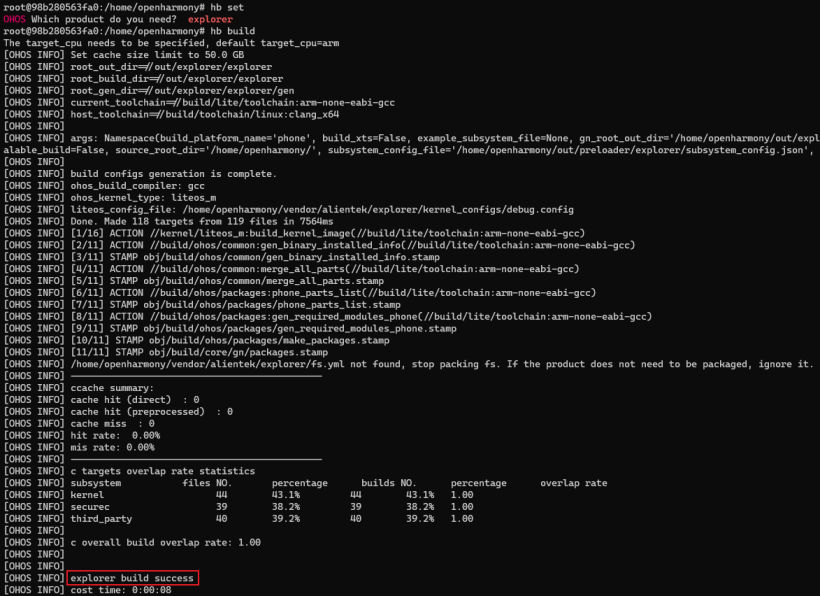
日志输出explorer build success表示编译成功。
编译过程中可能会遇到缺少某些结构体或者函数的定义,需要细心排查,注意宏定义是否打开。
STM32F407开发板支持串口和ST-LINK烧录方式,但OH编译出来的是bin文件,bin无法直接通过串口烧录。需要用到ST-LINK工具进行烧录,烧录时需要指定flash,开始地址:0x08000000,大小:0x100000。
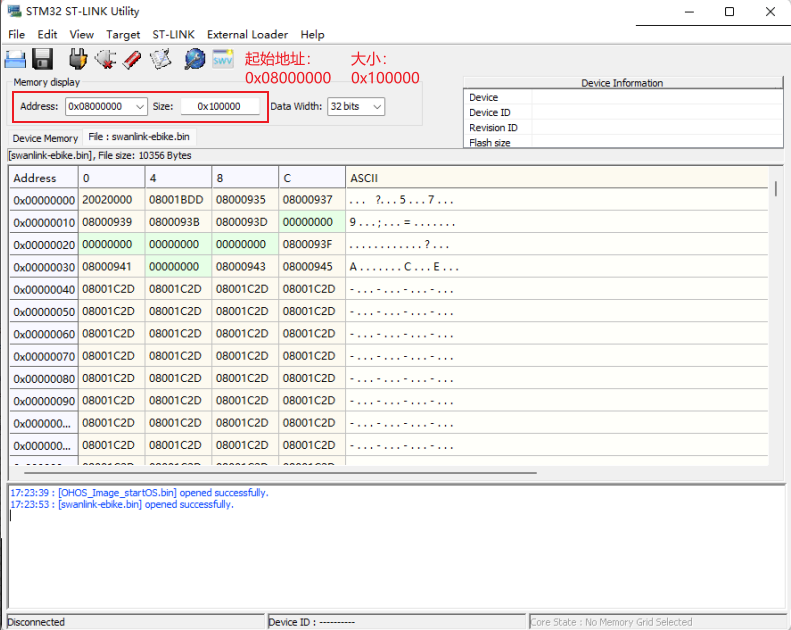
开始烧录
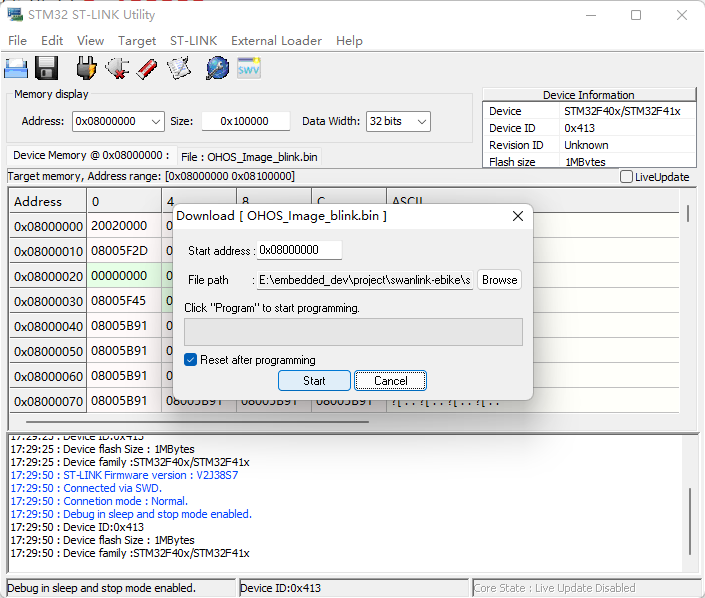
点亮开发板
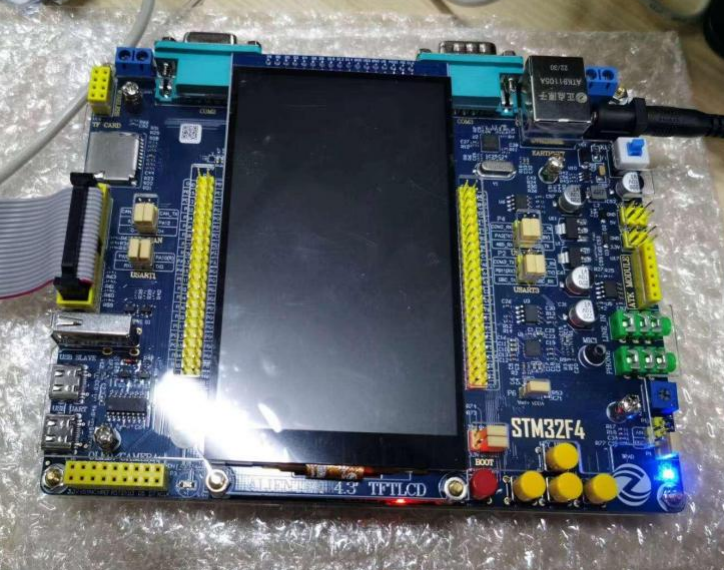
四、总结
本文主要讲述了OpenHarmony内核的SoC代码移植。因为STM32F407的架构和基础SDK都是官方开源的,所以移植工作也较为容易,但在实际工作中如果遇到未开源的芯片,那么需要模组或芯片厂商提供技术支持才可完成移植工作。到这里瘦设备OH适配的最核心工作已完成,希望能对热爱OpenHarmony的小伙伴有所帮助。







































